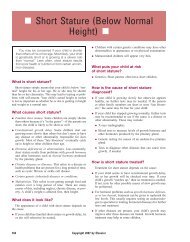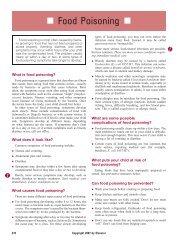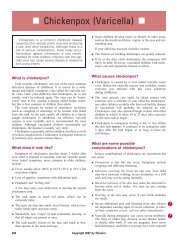Head Trauma (Minor) - Impcna.com
Head Trauma (Minor) - Impcna.com
Head Trauma (Minor) - Impcna.com
You also want an ePaper? Increase the reach of your titles
YUMPU automatically turns print PDFs into web optimized ePapers that Google loves.
138 n <strong>Head</strong> <strong>Trauma</strong> (<strong>Minor</strong>)<br />
Your child is not acting normally (is confused, groggy,<br />
nauseous, etc.) for more than just a short time.<br />
The physical examination was abnormal.<br />
Your child has persistent vomiting or severe headache.<br />
The usual test is an x-ray procedure called <strong>com</strong>puted<br />
tomography, or CT scan. The scan will show whether<br />
there is any bleeding or blood clot that may pose a<br />
danger to the brain.<br />
Skull x-rays. X-rays of the skull may be performed if the<br />
doctor thinks there may be a skull fracture.<br />
Observation in the hospital. If treatable problems are found<br />
but the doctors are concerned about the injury or the way<br />
your child is acting, he or she will be hospitalized overnight<br />
for careful observation to see if further treatment is needed.<br />
Home monitoring. In some cases, the child may be sent<br />
home for monitoring. You will be asked to watch him<br />
or her closely for the first 24 hours.<br />
Follow-up. Children with significant head trauma may<br />
need special developmental tests to detect small effects<br />
on the brain. These tests are often performed by a specialist<br />
called a neuropsychologist.<br />
Serious or severe head trauma resulting in bleeding or<br />
swelling of the brain requires treatment by a neurosurgeon<br />
(a surgeon who specializes in problems involving<br />
the brain) in an intensive care unit (ICU).<br />
When should I call your office<br />
While monitoring your child at home after being seen<br />
and evaluated, call our office if any of the following occurs:<br />
For any head injury that causes unconsciousness, grogginess<br />
or confusion, vomiting, or severe headache.<br />
Any time your child has a hard injury to the head, even<br />
if there are no symptoms.<br />
Worsening or severe headache.<br />
Weakness, dizziness.<br />
Vomiting.<br />
Difficulty waking.<br />
Different-sized pupils, or pupils that don’t change much<br />
in response to light.<br />
Seizures (involuntary body movements).<br />
Confusion or irritability; won’t stop crying.<br />
Copyright 2007 by Elsevier













